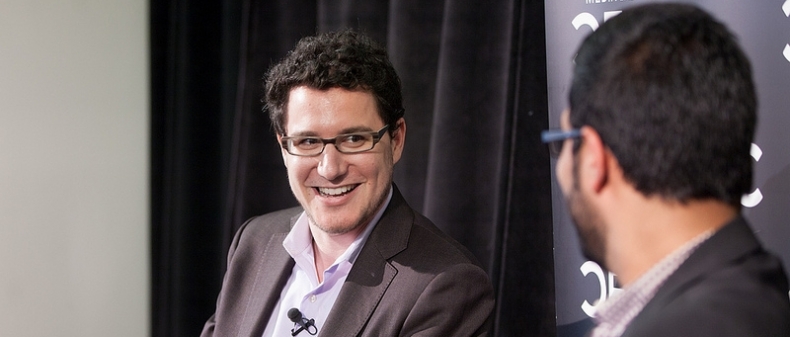
Eric Ries talks about redefining the startup at the MaRs Commons last week.
Photo by Mike Tjioe, provided by the CFC Media Lab.
“We need a redefinition of the term startup,” lean startup mastermind Eric Ries told a crowd full of entrepreneurs at the MaRs Commons last week. Ries is to startups what Steve Jobs is to product innovation. His creation of the Lean scientific methodology is designed to streamline the entrepreneurial process and test a product or idea in market as quickly as possible. His book, The Lean Startup, has become a bible to the entrepreneurial community since its release last year. Freelancers should take note and learn to adopt the startup approach.
The key to success lies in what Ries calls the Pivot, which is a change in strategy without a change in vision. It’s that moment when you recognize your approach isn’t working. This is about shifting the journey, not the destination. The pivot can mean the difference between success and failure.
“Entrepreneurship is the future of how we do work,” Ries says. No longer is this approach reserved for the innovative and lucky techies down in Silicon Valley. With less conventional jobs available, an increasing number of people from various industries are taking their careers into their own hands. It’s bled into the arts, digital media and fashion. Ana Serrano from the Canadian Film Centre Media Lab introduced Ries at MaRs. She said implementing lean startup methodologies into the business of film has helped them build an international network of filmmakers and producers. The strategy has found its way in even the most bureaucratic of places. The chief technology officer of the United States has implemented beta versions of the Lean method within the FDA.
All it takes is a shift in thinking, a smart approach and a little bit of DIY.
I’m in the midst of reading It’s So Easy (and Other Lies) a memoir by Guns N’ Roses bassist Duff McKagen. Key to GN’R’s early success was establishing and leveraging mailing lists. Yesterday at the Mesh conference, an annual two-day event exploring ways the Web changes how we live, an old school paper signup mailing list was passed around. I’ve noticed a lot of this lately. GN’R predated the era of Internet marketing and the band would literally phone every name on their mailing list to promote shows. They’d connect with their audience and try to sell tickets directly, usually to great success.
The strategy behind mailing lists is something independent contractors should consider. Mailing lists allow people to willingly sign up to learn more about your offer. It doesn’t matter if it’s a product or an idea or a band or a campaign. It doesn’t even matter if you’ve launched anything yet. The entrepreneurs at Mesh’s “Tales from the Trenches. Stories from Startups” panel emphasized the significance of generating interest and establishing a list of connections early on. They recommended utilizing Launchrock, a service that allows you to build a landing page before your launch. You can create anticipation and start collecting data from your audience well before you or your product/idea hits the market.
Of course to do this successfully, you need to offer something people want.
“There’s no such thing as a good idea, but you can build a better mousetrap,” says Mark Evans, one of Mesh’s founders and the digital and social media strategist at ME Consulting.
Think about that. A newspaper executive once told me anybody can write, but not every one can convince people they can. We don’t exist unless we show people we exist. In oversaturated markets especially, there are no new ideas only new approaches. Look at the piece I wrote about Piccsy, which at its early stages is almost a clone of Pinterest, and the way founder Daniel Eckler caters his sales approach. Not only does he exploit a different angle, but he also notes how similar services validate his own.
To convince people an idea is different and better even though it sounds the same you have to be disruptive. Disrupt. Disrupt. Disrupt. Everywhere I go, every talk I attend, this buzzword screams like a young child begging for attention. In a recent blog post for Startup North, Evans wondered about its exact definition. The general consensus is that disruption is a product or business model that can wipe out the competition, usually by making something available to a mass consumer base that was traditionally expensive or unattainable. It’s about creating an innovative new solution for an existing problem. Instagram is a perfect example of disruption.
For freelancers, it’s about making people want your work over anyone else’s. It’s about doing something different, even if it’s the same. Look at Cat Marnell, the beauty and health director over at xoJane. She is disruptive because she is honest, controversial and ultimately fascinating. She’s not at all business savvy, but her approach makes people feel and think. Marnell draws people to her specifically because she offers something different and new. She doesn’t play by the rules. She takes risks, defends her cause and isn’t afraid to fail.
Failure itself is a sexy theme in the startup community. Everyone is so afraid to fail it’s become romanticized, and notable people like Evans are constantly saying, “The starting point for startups is failure. Then, you start from there.”
Heather Payne, founder of Ladies Learning Code, agrees. She’s gearing up to launch a new platform within the next 10 days that will shift the way she operates her not-for-profit coding business. Payne took a brief moment away from her always composed and professional demeanour to get honest. “Choose something you’re wildly passionate about,” she said at Mesh. “The shitty days are really shitty days. You need to choose something you really give a fuck about.”
Ben Zlotnick is in the business of startups. He founded INcubes, an incubation and acceleration program for Internet startups. He looks through dozens of applications and hand selects which companies to invite to participate in the program. He chooses startups with founders that ooze passion. It doesn’t matter the age or industry. “Mainly, it’s a fabulous idea that they’re looking to take from nothing to something.”
Unsurprisingly, every applicant thinks his or her idea is fabulous, but not every applicant is cutout to be an entrepreneur. Zlotnick meets people who don’t have any sales or networking skills, don’t know how to manage a business and haven’t devoted months, years or whatever it takes into building their company. They need direction. They need to pivot.
Freelancers could benefit from pulling more pages from the entrepreneurial manual. Look at yourself as a startup. Stay on top of your competition, build a network of people before you ever need to use them, know when to kill an idea and learn how to say no. Time is money, but time is also time. Two less hours in a meeting means two more hours to spend with your girlfriend or to develop your ideas.
“Everyone thinks that if you have an idea, it’s going to take off,” Zlotnick says. Ries echoed the same. He said, “Success is about value, not hype or fame.”
In the end, it always comes down to passion. A good idea may define a startup, but passion is what defines an entrepreneur and passion should be what drives every freelancer.
____
Sheena Lyonnais writes about tech for Toronto Standard. You can follow her on Twitter at @SheenaLyonnais.
For more, follow us on Twitter @TorontoStandard or subscribe to our newsletter.














